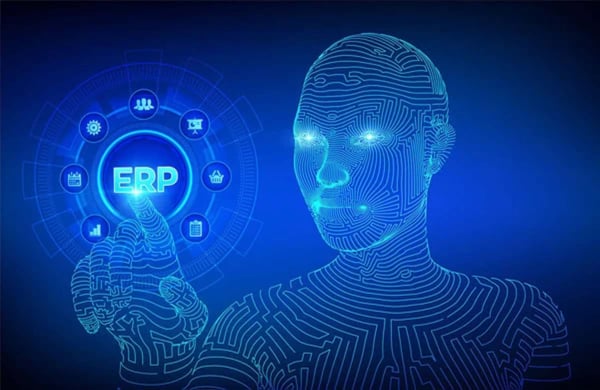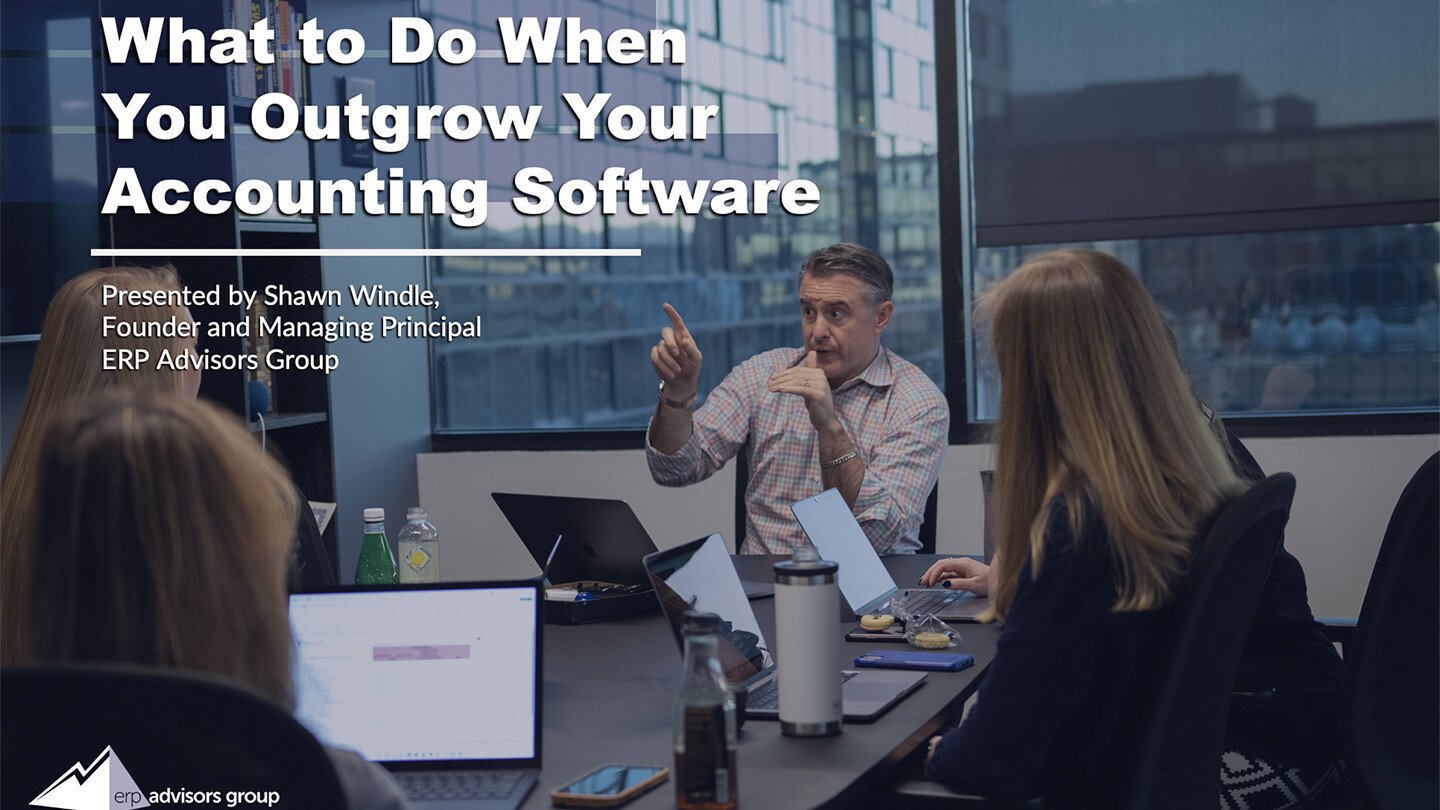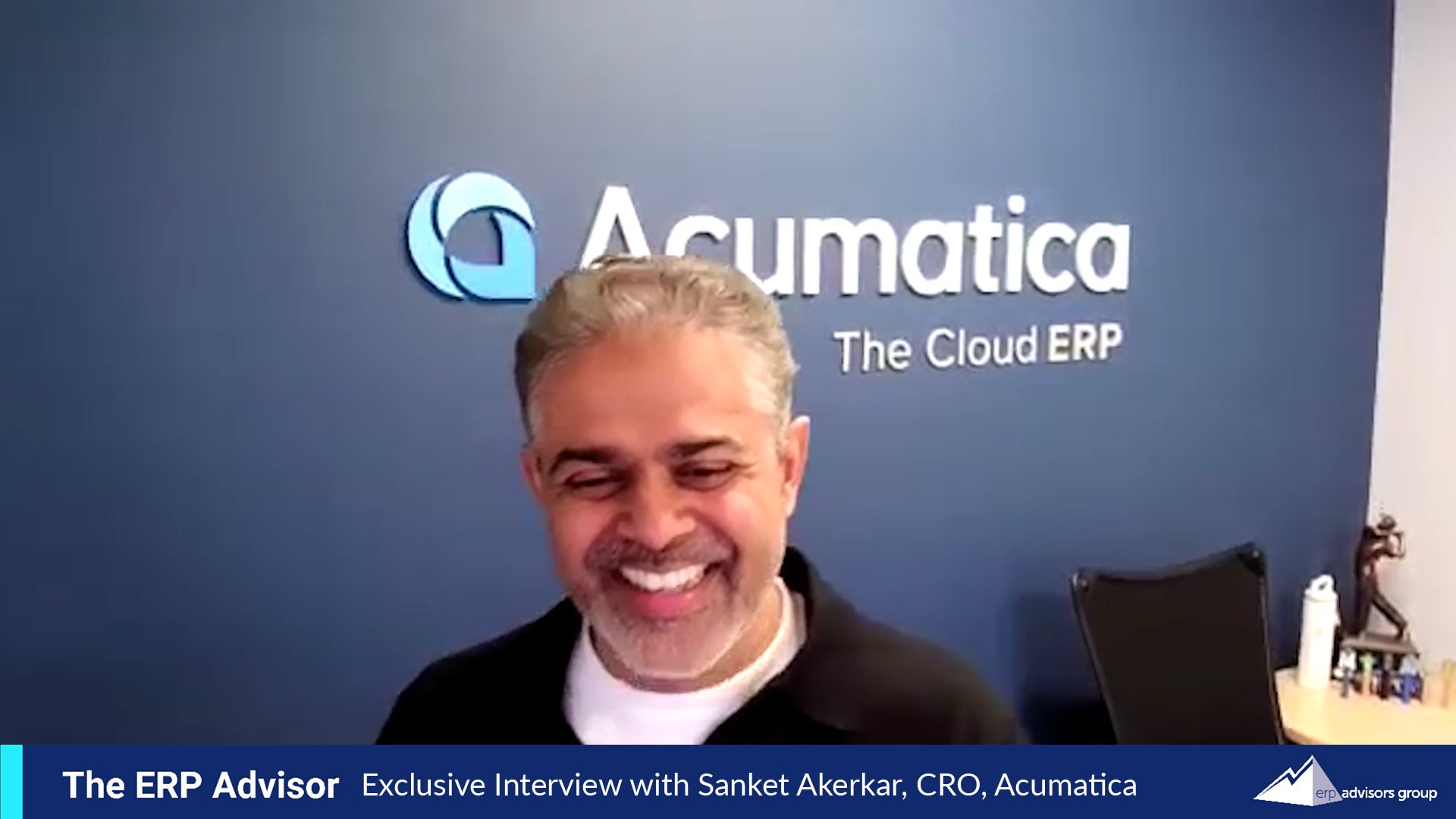
In recent years, there has been a great deal of focus on artificial intelligence in software and just about every industry. It seems like just the mere mention of AI can conjure fear and confusion, so let us dispel a common misconception: Artificial intelligence is not an evil.
While there is a fear that AI will usher in an age of robot overlords — as depicted in movies like The Terminator or Avengers: Age of Ultron —these examples paint a grossly exaggerated picture of what AI is capable of. As Kilian Weinberger of Cornell University explains, “AI reaching consciousness — there has been absolutely no progress in research in that area. I don't think that's anywhere in our near future.”
So, what truly is artificial intelligence? Put simply, systems powered by AI are those that simulate human reasoning and intelligent behavior. These systems are capable of completing tasks that typically require human intelligence.
AI is just beginning to make a wide scale appearance in ERP software systems, but it has already been used in technology for some time, even just in everyday life. Built-in smart assistants in your smartphone or other smart devices, such as Siri, Alexa, and Google Assistant, speech recognition software, security services, streaming services, drone delivery services from companies like Amazon, are all examples of AI in everyday technology.
A Profound Impact
CIO magazine put it best when they wrote about how artificial intelligence making its way into business tools back in 2016: “Without a doubt, artificial intelligence (AI) will have a profound impact on the footprint of enterprise resource planning (ERP) solutions in the foreseeable future. AI will enable organizations to further optimize their operating model made up of business processes, software applications, governance structures and technology infrastructure.”
Artificial Intelligence in business applications is powerful and continues to augment the effectiveness of ERP solutions everywhere. In fact, AI-based ERP is already part of many familiar platforms:

- Epicor debuted EVA, an AI-based voice command user interface earlier this year that is aimed at improving productivity.
- Microsoft provides users with cognitive services, bot service, and cognitive search through its Azure AI.
- NetSuite launched its first intelligent cloud suite in 2018, which enables professionals to gain better insights and greater efficiency through predictive, prescriptive and automated outcomes.
- SAP has a cloud-based predictive maintenance system based on machine learning algorithms, as well as a chatbot that uses machine learning technologies, among other AI-enabled processes and tools.
Accelerate, Automate and Improve
A primary advantage of artificial intelligence in ERP is that it makes it easier to automate business processes across an organization and track key data about the resources throughout that organization. Making intelligent decisions relies upon the efficiency of your processes, after all.
Looking at legacy business logic and expert systems like Oracle and SAP, it seems clear that AI-enabled ERP was in its infancy 20-30 years ago. Today, AI in ERP systems helps so many areas of a business operation, including accounting, purchasing, and procurement.
The benefits of AI in ERP include:
- Forecasting
- Analytics
- Making purchase decisions
- Accurate demand planning
- Human capital management (matching candidates with positions)
- Marketing products to people who want to buy them
- Maintaining high customer service
- Mining data for important trends
So, should you develop and execute an AI strategy? Our answer: it depends. Yes, it might make sense for your company to implement an AI-based ERP, but it is not intended to be a siloed initiative. You should, however, evaluate your most pressing business issues.
Consider the key decisions you make on a regular basis and what kinds of insights and information would help you improve them. There are applications out there that embrace AI that will take you to the next level and help you make more uniform decisions across your enterprise.
We at ERP Advisors Group believe that AI should be part of the foundation upon which all ERP systems are built—and soon, it will be. Your ERP platform enables good decision-making. And what business organization doesn’t want to improve that?
The way that people use AI to solve business problems is always evolving. You might not know the details of how machine learning could play a role in your business process improvement initiatives, but rest assured, this technology is transforming ERP platforms and companies across the globe. And chances are, the ERP platform you use today or the one you’re considering implementing in 2020 might already embrace AI technology.
Call ERP Advisors Group
If you have questions about AI and how to identify and implement the right ERP system for you, call us. We’re here to answer your questions about how AI is already a part of ERP, and what to expect in the future.
Juliette Welch: AI has crept into ERP: Are You Ready?
Shawn Windle will be our speaker for today. Shawn is the Founder and Managing Principal of ERP Advisors Group based in Denver, Colorado.
ERP Advisors Group is one of the country's top independent enterprise software advisory firms. ERP Advisors Group advises medium to large sized businesses on selecting and implementing business applications from enterprise resource planning, customer relationship management, human capital management, business intelligence, and other enterprise applications which equate to millions of dollars in software deals each year across many industries.
On today's call, Shawn will discuss how artificial intelligence has pervaded the digital landscape and how it is impacting ERP on a practical level today and what we expect to see in the future. Shawn, if you're ready to take it away, I'll hand it over.
Shawn Windle: Thanks, Juliette. Yep, this is Shawn Windle with ERP Advisors; I’m the Founder and Managing Principal and I'm really excited to talk to you about one of the more — I guess it's prevailing. You care more about artificial intelligence — I don't know — maybe last several years I've heard a lot touching on AI, but really prevailing in the ERP space, I think there's a lot of hype for sure, but there are some really interesting things that we're going to share with you today in hopes that you have a really good, practical, conceptual understanding of AI and how it really does fit into what you're trying to do with ERP, so let's get into it.
And I think the best place to go is to clear up some misconceptions around AI and really, even talk about what AI really is. When we say AI we're of course are talking about artificial intelligence.
One way of doing that is telling you what it's not about and what it's not about is applications or things like Skynet from the Terminator or Hal from Space Odyssey or one of my favorite examples which definitely shows my age was a movie from Matthew Broderick back in the day called War Games where you had these computers — software systems — that really were something to be feared. I mean, we even see that in The Avengers where software becomes this bad thing.
But the reality, especially with people who are super close to this kind of work says is that AI is reaching consciousness. There's been absolutely no progress in research in that area. I don't think that's anywhere near or anywhere in the near future.
So those kinds of concepts of AI taking things over and controlling the world — that's a pretty far-fetched idea. But you look at — I think there was a new movie recently with — oh the Spiderman movie! My daughter loves Spiderman. She just loves that movie and I was kind of like oh my god, we've got these drones that are taking over.
But there's always evil people on the planet. There just are. There's not a lot of them — maybe a small percentage. And sure, those guys are going to take something like AI and make it bad and set all these drones to take over the world or whatever, but the rest of us are going to make sure that it doesn't happen, so it's sort of like okay, we're not going to worry about AI in this.
Again, one of the experts that I just quoted said, you know, we're going to handle that so fine. Now what do we really talk about when we're referring to artificial intelligence? What does that really mean with all those misconceptions out of the way?
And there's definitely some different definitions that we've seen. But it really comes down to systems that use human reasoning as a model in order to get work done. So, you could kind of think about a simple definition around computer systems that can perform tasks that normally require human intelligence. That's it. Don't make it anymore complex than that.
And there can be all kinds of functions and tasks that that we can do with AI. Like, speech recognition is probably the easiest to see and probably the most prevailing, but there's also things like software reviewing a document and having visual perception that's brought in, or even decision making.
So, if you have an iPhone, there's a ton of AI that's happening. You've got all the way from the face recognition that runs when you look at the software to Siri who takes what you're saying and converts it into something that can make decisions from a software perspective. So, lots of opportunities out there to leverage software, but it's not explicitly programmed to do it for that specifically. So that's kind of — when we talk about AI what we mean now.
The interesting part about it is, what does that mean for ERP? And the reality is that there is — I'm sure, ten years from now we better do things better to be honest with you as an industry — but we're not doing bad with artificial intelligence even today.
And several of the vendors that we work with from Microsoft and Epicor and Acumatica and NetSuite have kind of started building AI and machine learning into their platforms. And yeah, there's a little bit of some marketing hype behind that, but it's really true that you're starting to see even with like an Epicor application where they've got some virtual assistants that are going to start coming out later this year.
So, you've got kind of this convergence, I think between a legacy technology which I'm not sure how legacy ERP is, there's over $50 billion spent a year in mid-sized companies alone, just in mid-sized businesses, like I said in North America. So that's a big market, and so we can kind of help that area to leverage these new technologies, that's good for everybody.
Interestingly enough, if you kind of look back to even some of the origins of AI, you can actually even start to see that that this space that we're in of ERP applications — and those that are listening to the call care about or you probably wouldn't be on this call — it's kind of one of the basis for where a lot of AI came from.
It's really interesting that when you look at what ERP tries to do, which is to automate business processes across the organization and track the key data about the resources throughout the organization, in a way, you have to have those processes and transactions in place and data to even do any decision making on.
So, if you think about the basis for what AI is really generated from, we were able to build the platform that then these applications can run on in business. And if you look at business logic and expert systems, especially from firms like SAP and Oracle, you really realize this was the beginning of AI.
So now when we look at where things are going and the benefits of AI going forward with ERP solutions, you can kind of look across some of the major business processes that were already kind of automating and helping to manage. Like you know, even in a tournament — so we have some clients that spend hundreds of millions of dollars per year on buying stuff.
We've got some heavy asset industries that we work with. We've got many distributors that we work with and how do they know what to buy and from whom and when? And so normally that would be MRP, materials requirements planning, back in the 80s is when we started — really the 70s is when we saw those applications start to come on board. And we're using heuristic and all kinds of algorithms to make these decisions. Well, guess what? That's AI. Well, now with the software computing the hardware side as well as the software itself being more cheap to put in place, we're seeing our clients making much better purchase decisions on applications and doing demand planning and MRP to a whole new level because of AI, so that's very real.
And even in the HR space, if we look at human capital management, being able to match candidates with positions and really even forecast into the future to say which candidates we think are going to be our top performers, right there we're basically employing artificial intelligence and years and years of decision making into deciding who we employ.
So, some fantastic opportunities. And it just kind of goes across the gamut from even the manufacturing side with labor schedules, how to best optimize and predict demand and how much inventory levels are needed to — certainly ecommerce with serving up products that customers are more likely to buy based on key indicators such as past purchases or search history or results of similar buyers or even the geography that they're located in.
We’re doing a business trip here in Florida and I'm amazed at how Google keeps positioning things from Florida for me — and actually Facebook — and then I got an email from Lufthansa, I just took a flight internationally and we found Lufthansa sending me ads for flights from Tampa to Rome and Tampa to the Netherlands. And I'm like, oh my gosh, these guys they know man, they know that's just the way it is and that's artificial intelligence that they're using from an economist perspective.
Of course, on customer service, too, enabling service professionals to have a better feel for how valuable the clients going to be and looking into costs and anticipated satisfaction and information out of customers — likelihood of renewal is super important.
The purpose and why we wanted to do this call was because — don't make AI some cliche, like totally separate initiative that we have to have a AI strategy, right? It's the same advice that we've given folks who have listened to our calls on cloud in the years past that I've got to have a cloud strategy AI strategy or there's also some other kinds of emerging things that are happening around automated process flows now. Like I was involved at one of the — well, actually now it's Oracle, but JD Edwards and PeopleSoft 20 years ago — an initiative around taking these business applications and making them more process-oriented called business process management. And it was going to change everything, and it actually did change everything. But when you look at how these key technologies emerge and you kind of spin them into the ERP world, they always have to solve real business problems.
So, if there's one key nugget that you can get from us today it’s if you look at some of your biggest business issues across the enterprise, you have some basic data in place, transaction-level processing is in place, you're capturing key data, you're even able to report off of this data.
Look at the key decisions that go into what you do with the data and inevitably there's apps in the market that will take you to the next level of how we build in the decision making process into these specific applications that then can provide more value out and even drive to the next level of uniformly making decisions across your enterprise as you get bigger.
If we can build out really good AI models and decision making, and we're basing our decisions off of a collective unconscious if you will — from Star Trek — but your decisions are going to be more uniform across what you're doing. And I mean every person on this call has applied for a credit card or a mortgage or whatever, and you bet the banks are employing AI to make those decisions today.
So as the summary, we really do believe that that artificial intelligence will become really the foundation that all ERP is based on. We're moving again away from transactions and just reporting to business processes and now this next evolution is really around decisions.
So, there's tons and tons of benefits to that automation and to the machine learning. This is not something to be afraid of.
Erica and I were the owners of the business and we have a son who's about to graduate from high school and we don't believe that his job is out of college is going to be automated by machines. It's not going to happen.
There of course are going to be continuous evolutions of how companies and people are using AI to solve business problems. But again, another key time step for you all is how do we take advantage of those benefits and really make a difference with the organization and with the business? There's always going to be a need for people that can make those decisions and can really apply and understand what real fundamental problems are and then put in solutions to solve them. We’ll just hopefully make the planet even better. I mean, that's why we're in business. AI is really a good tool to do that.
So most likely your ERP solution should be incorporating AI already, and probably is whether you know it or not, especially around demand planning, forecasting, analytics. There’s some applications like Anaplan that are really leading the way in those areas as well that are super strong there.
So, then you have the other part of this too is if it's not, then let's talk to you about that, too. As a firm, we can help you decide if it's right for you. And more importantly, for your use case that if there's benefits or not, and a lot is going to depend on the amount of automation that we can get and the business benefit.
So, this is this is kind of a good discussion — and Juliette, I'll wrap up here in just a moment. A little bit higher level topic, but again, it's really important for everybody on the call to understand that this isn't something that isn't going to come to ERP, it's already here. Don't be afraid of it. And more importantly, look for opportunities to leverage artificial intelligence and some tools in the markets. And definitely talk to your existing software vendors, the people that sell you the software as well as your implementation partners to find out what you can do more, but just make sure there's real businesspeople behind it first before you just do what I call “a techie beanie weenie” exercise — like actually look for real business benefit and you'll find AI is super helpful to you.
Yeah, that's it for today, Juliette, back to you.
Juliette: Okay, Shawn, thanks very much. A lot of great information as always.
Thank you everyone for taking the time to join us today. Please let us know if we can answer any questions. Call us, reach out to us through our website. We're happy to help in any way we can.
Then please join us for our next call on December 10th: Post-Go-Lives: How to get the full benefits of your new ERP system. We will discuss how to maximize the value and gain the full benefits of your new ERP system. Please go to our website erpadvisorsgroup.com to register.





